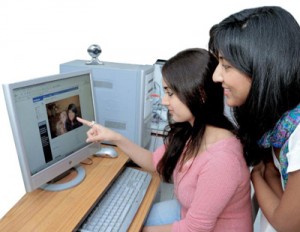The digital connect
View(s):Social media networking has definitely changed the way we communicate. Aruna Sankaranarayanan talks about the need to exercise caution about what we post.
A 12 Grader feels he is unfairly chastised in front of the class by his Maths teacher. Angry and humiliated, the teenager goes home and adds a post on his Facebook wall, describing the injustice meted out to him. Within minutes, the boy receives a dozen ‘likes’. Buoyed by the enthusiastic support, he appends a couple of swear words before the teacher’s name. By late evening, more comments and ‘likes’ pour in.
That night, the boy’s father happens to see the FB comments and goes into a rage. He makes his son delete all the posts, but alas, it has already created a buzz online. The next day, the headmaster suspends the boy for a month saying that this incident will be mentioned on his conduct certificate.
Social media such as Facebook, Twitter, etc., have definitely transformed the way we communicate and interact. News spreads virally, instantly and simultaneously to multiple parties, thereby, creating a revolution in communication. Given the vast and instantaneous reach of new media, we have to be especially careful of how we use them as they have drawbacks as well.
Changing times

Need to be especially prudent as postings and pictures on social media can impact their lives in unimaginable ways
In the pre-Internet days, what would the 12 Grader have done after being scolded by his teacher? He would have gone home and probably called a friend, and expressed his anger and frustration. The friend, in turn, may have called another friend, and typically the matter would have ended there. However, in the digital age, by giving vent to his negative feelings on a relatively public platform, the boy has unnecessarily tarnished his reputation.
As today’s youth flock to social media like children to candy, youngsters need to be especially prudent as postings and pictures on social media can impact their lives in unimaginable ways. Foremost, we must remember that social networking sites are in the public domain, no matter how careful we are about privacy settings.
Thus, we must exercise caution before posting personal and sensitive information.
Further, we need to remember that we all have multiple selves — we behave differently in class, in the college canteen, at a family wedding and on a picnic.
But on most social networking sites, these identities tend to meld as all our contacts are privy to our posts.
So what may be an appropriate comment to a friend may not be suitable for a teacher. We have to ensure that we do not treat our contacts as a homogenous unit.
The consequences
In the cut-and-paste digital world, we can effortlessly add and delete content at the click of a mouse.
Thus, while we may delete an inappropriate picture or post, that does not mean that we have erased it from the minds of those who have already seen or read it. In the above example, the 12th Grader got into trouble even after he deleted the post.
Thus, while we can retract posts, we may still have to face unintended consequences. Whenever we make a comment or upload a picture, we are creating an online trail of ourselves that can be tracked.
Further, some employers check FB profiles of candidates they are hiring; so next time, you are putting up pictures of a beach party you attended, ask yourself if you would want your potential employer to see those snapshots.
Net addiction
Youngsters should also self-monitor how much time they spend online. Nowadays, people are tethered to their devices no matter where they go. While there are obvious advantages to 24/7 connectivity, Net addiction can be detrimental.
In her book Alone Together, MIT professor Sherry Turkle describes a scenario where young American students failed to make the most of a foreign placement programme. Instead of “experiencing Spain,” the students were glued to FB and online chat rooms during their free time. Time spent online also reduces the time you spend extending yourself by engaging in other recreational activities.
Despite the umpteen ‘friends’ we have online, we need to cultivate and maintain ‘real’ friends whom we see face-to-face and interact with in person.
Turkle notes that adolescents find personal interactions increasingly difficult as they are so used to hiding behind a screen while dealing with people.
When we communicate online, we do not gain access to a person’s tone of voice, facial expression and body language — nonverbal aspects that are integral to our humanity.
Finally, and most importantly, every person, especially youngsters, needs downtime to reflect, ponder and discover him or herself. By shutting out the dizzying din of digital distractions for a few minutes everyday, we can recharge and reclaim ourselves.-thehindu.com
Follow @timesonlinelk
comments powered by Disqus























